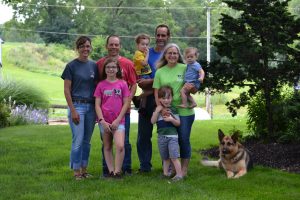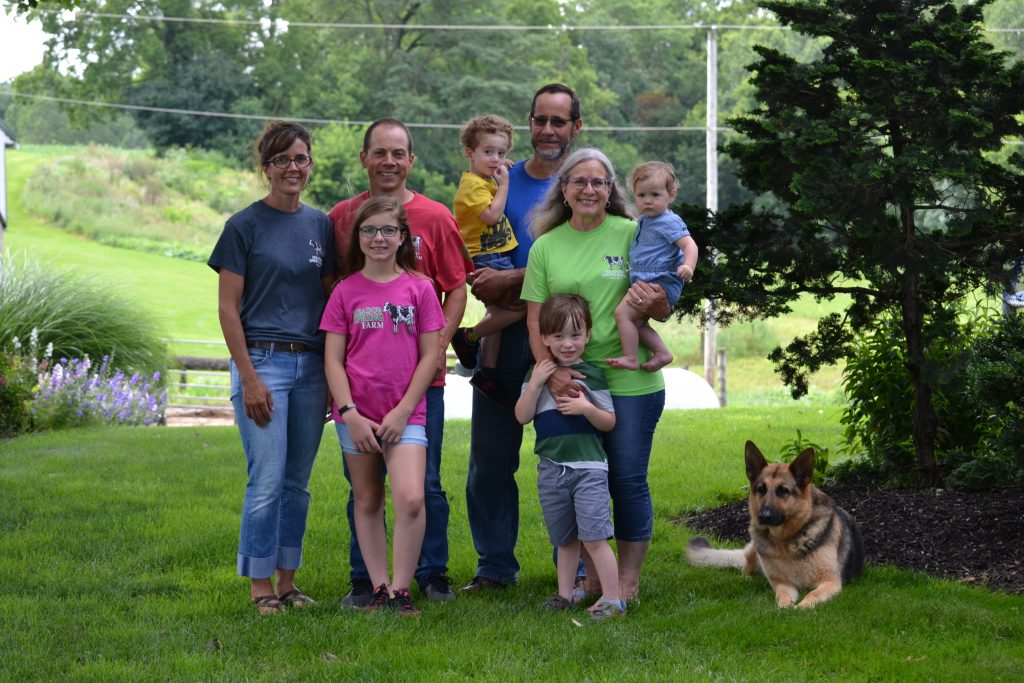
Andy Bollinger of Meadow Spring Farm in Lititz, Pennsylvania has witnessed multiple transitions and transformations during his lifetime. After joining his family’s partnership in 2004, their farm used a team approach when making major changes to their dairy operation. During a recent webinar with the Center for Dairy Excellence, Bollinger shared how this way of thinking and willingness to step outside of his comfort zone has always been engrained in him.
“When I graduated high school, I went to a year of dairy management school. I think of this as my first ‘team,’ even though it wasn’t any sort of true advisory or transition team,” he said. “It certainly got me out of my comfort zone, and I saw a lot of different farms in that year. I didn’t get a degree from it, but I got a lot of life experience”
When he returned back to the farm that year, his family broke ground on a new free stall barn, bunker silos, and a step-up milking parlor. In 2002, they built another free stall barn and new manure pit, and in 2008, they decided to install a manure solids separator and stack shed to hold excess solids. Today, 100 percent of their cows’ manure goes through that separator, but it hasn’t been without its initial challenges.
“When we built the manure separator, we thought we were going to do a digester. It was kind of intriguing to me, and we heard a presentation about a new style digester that we thought sounded great,” he shared. “Eventually we started to realize their technology was not proven and we wanted to back out. It was a messy situation, and it was probably one of the most stressful things I’ve dealt with. I’m not very confrontational, and it really weighed on us. However, it did lead us to good things.”
One of those things was a Transformation Team grant through the Center for Dairy Excellence, which was recommended by one of his consultants. The prospect of gathering fresh, new ideas interested the Bollinger family, and after being accepted into the program, they established a transformation team that consisted of their farm family, accountant, lender, veterinarian, Penn State Extension representative, Center for Dairy Excellence representative, local businessman, and a facilitator.
Bollinger says the team had six meetings where they explored four key focus areas:
- Renewable energy and conservation efforts. The transformation team toured a few digesters in the area and helped the Bollingers decide whether it was a good fit for their farm. “I know they are working extremely well on some farms, but there was too much about it that didn’t feel like a good fit for ours. No key person wanted to manage it,” Bollinger said.
- Employee management. “One of our transformation team members had a great skillset in talking and interviewing people. We came up with a list of questions, and he sat down with each of our employees,” Bollinger shared. “He compiled their answers and shared the results with the whole team. Most of the feedback was positive, so it gave us a good boost. It helped us know how to handle people and handle different situations on the farm.”
- Viability of diversification and direct marketing. “We have seen a lot of farms do this very successfully, but we also felt like we do a good job producing milk at a low cost and making a living with just producing milk,” Bollinger said. “We decided to focus on ways to lower our cost of production to make ourselves even more competitive.”
- Business planning and strategic planning. “The transformation team helped us to secure a PENNVEST grant, which helped us address some manure run-off concerns on the farm. We also did some number crunching on our old step-up parlor, which was 16 years old at that point. We realized by saving time in employee labor, we could pay the debt service on a newly constructed parlor.”

In addition to making transformations at the farm level, Bollinger also discussed the importance of establishing a transition plan among family members. His transformation team was a key part of helping his family navigate the process of transferring assets.
“Based on discussions we were having with the team, my parents really wanted to have a smooth transition of the farm in place for me and my wife,” Bollinger said. “Our accountant took charge of that and worked with an attorney to put together a transfer of assets, which also addressed my non-farming siblings. It helped to ensure they will receive value from the farm in the future and gave me the ability to continue farming for a long time.”
Today, the Bollinger family milks approximately 400 cows and excels with a 36 percent pregnancy rate. They have three full-time employees and as many as 20 part-time employees, and continue to work with trusted advisors to make strategic decisions for their operation.
Apply for a Transformation Team Grant
If you’re interested in a Dairy Transformation Team, the grant can help you plan and execute a major business transformation. Farms can receive up to $3,500 to establish a team to help work through your transformation. Limited grants are available for the 2020-21 year and are available on a first come, first serve basis. Once approved, farms can utilize the grant to be reimbursed for any qualified expenses incurred from July 1, 2020 to May 31, 2021.
Visit www.centerfordairyexcellence.org/grants to apply online or download a printed application. Contact Melissa Anderson at 717-636-0779 or at manderson@centerfordairyexcellence.org with questions.

